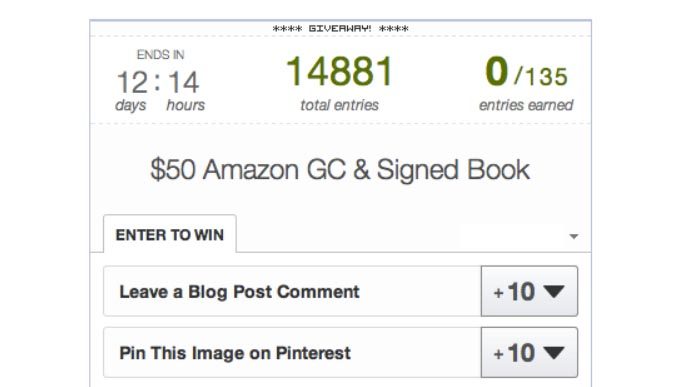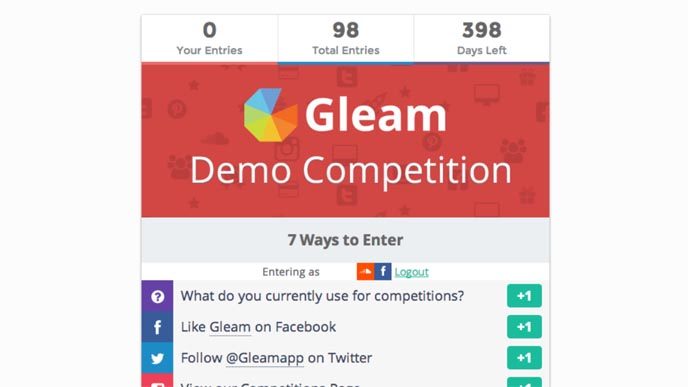The good news is that, at least to some degree, the Internet has leveled the playing field. Anyone with an Internet connection can set up a Twitter account. Anyone with a smartphone can launch a successful YouTube channel. Heck, you can get your own blog or website on the web for practically nothing. Anyone can have a voice online. But therein lies the rub, because everyone can have a voice online too.
Hey! Look at Me!
Breaking through this incredible signal-to-noise ratio is truly the greatest challenge for nearly every content creator. You’ve got a blog, but it’s one of an estimated 440 million blogs in the world, a number that’s probably much higher by the time you read this post. So, you have to promote. You have to get your brand “out there” in front of the right audience.

And for almost as long as I can remember, one of the more popular ways to promote your blog is by hosting a blog contest or giveaway. Maybe you fund this giveaway yourself, maybe you get a sponsor to supply the prize, maybe you collaborate with other bloggers for maximum reach and impact. The specifics here don’t really matter.
It’s about giving something away in the hope that you’ll get something even more valuable in return. But do these contests still work in an age of social media algorithms and crushing Google updates?
Contests Suck for Creators
According to a report and analysis conducted by Creator Hype, contests suck for creators. They say that because of how the system works these days, your contest “doesn’t reach your audience, they don’t engage with it, and they don’t win it. If that’s not the definition of broken, we don’t know what is.”

At the heart of their argument is the fact that the overwhelming majority of blog contests and social media giveaways are won by “professional contesters.” These are people who actively search for contests and giveaways online (and offline), people who aren’t really interested in your brand and your blog or your content at all. They just want to win “free” stuff.
This has sparked a whole industry of contesters. In fact, it doesn’t take much to come across several guides on how to become a successful contester, including the various discussion boards and forums you can follow. In the Creator Hype analysis, they looked at 65 contests run by 37 Canadian creators.
All I Do Is Win, Win, Win
Of all the people who entered the contests, more than three-quarters entered at least half of all contests. This is “absurdly high” given that the contests and creators spanned such a wide variety of niches and verticals. These “professional contesters” are entering everything and anything, so that means that real readers, the folks you’re really trying to engage, have a pretty slim shot at actually winning you select the winner at random.

The stats continue to show that 83 percent of all the tweets for entering these contests are coming from the professional contesters too. It probably won’t shock you to learn that 97% of the Twitter accounts of these professional contesters are used ONLY for entering contests. They might be real people, but for all intents and purposes, they’re really not. Professional contesters have ruined it for everyone, apparently.
It Starts With Strategy
But is that totally true? I don’t think so. Professional contesters are certainly an issue that need to be addressed, but they’re only one part of the picture. Blog contests can still be effective, depending on the actual goals you’re trying to accomplish with these contests. They can still be used to build your mailing list or grow your social following if you’re looking for a numbers boost. We all know how important and powerful appearances can be, even if you’d rather have a large following of truly authentic and engaged users.
It also depends on how you choose to setup your contest in the first place. Remember the ice bucket challenge from 2014? That was for charity and for raising awareness, so the context is a little different, but you can certainly borrow some inspiration from the virality of the stunt. You can also see how the “personal video” dynamic of that stunt virtually eliminates the problem of the professional contester altogether. If they’re willing to put in the effort to make a real video, they may as well be a real entrant.
So, at the end of the day, the answer to our original question is the same answer you’ll find to so many other questions. It depends. As Rebekah Carter of SproutSocial says, social media contests still work, “but only if you use them carefully.”
